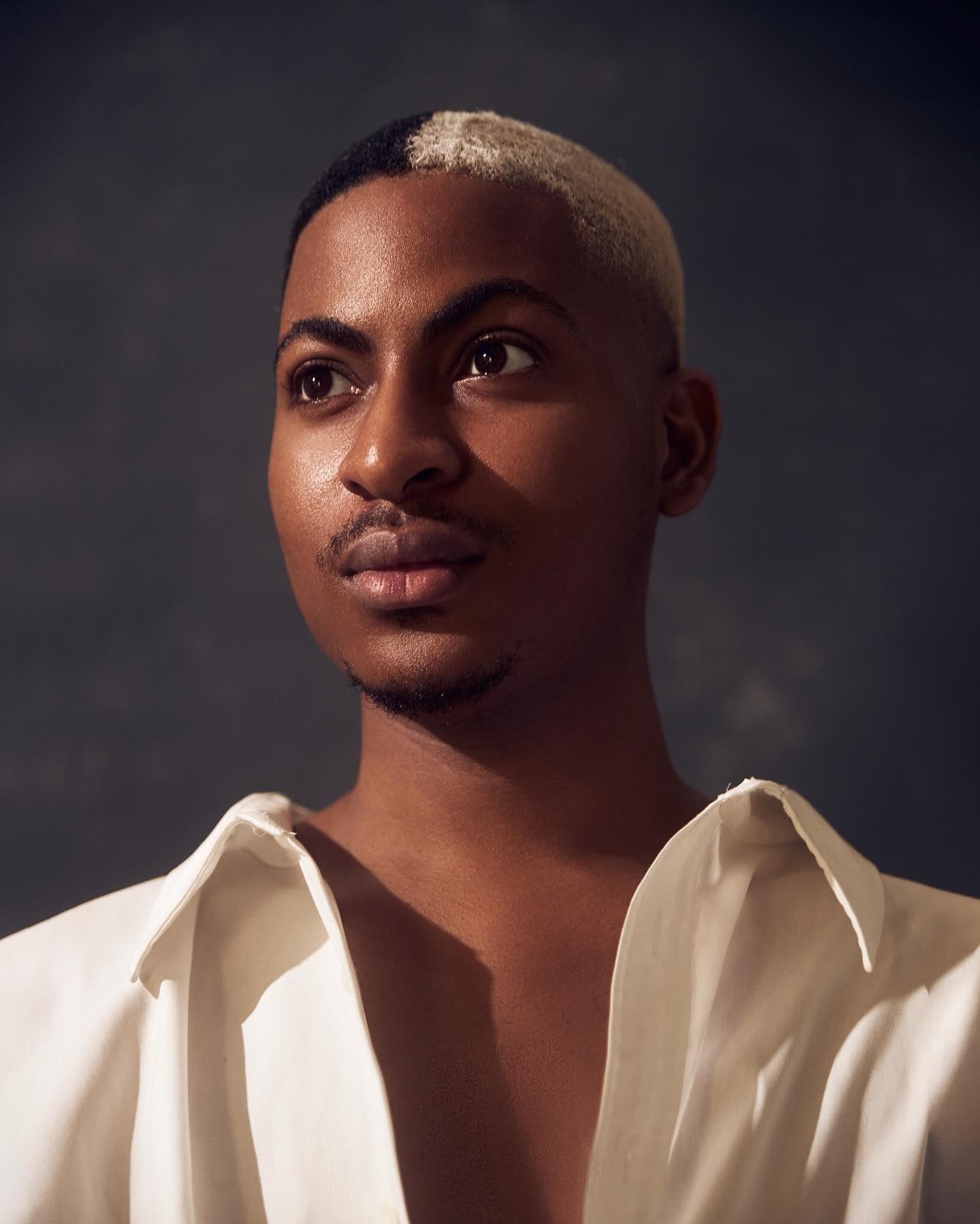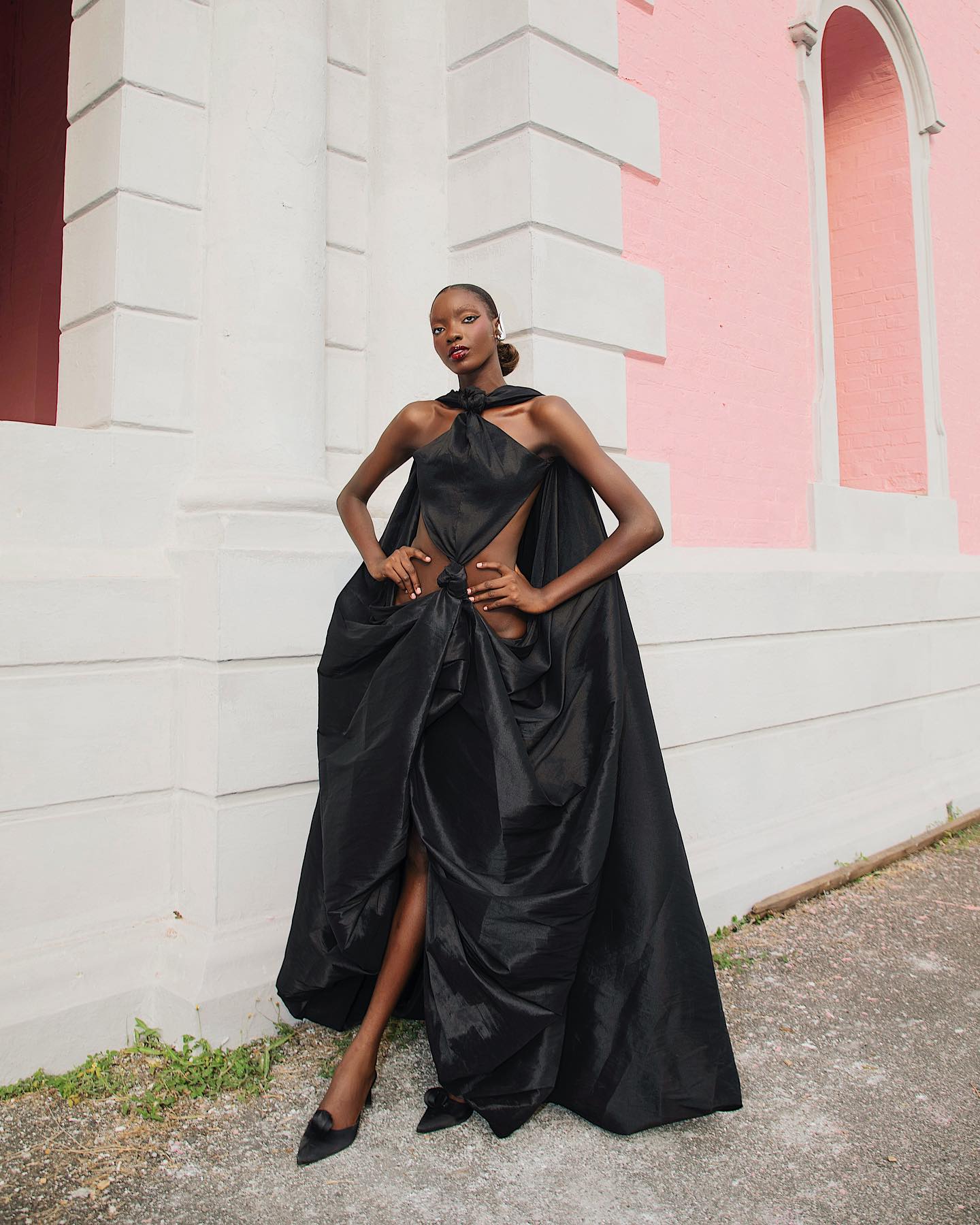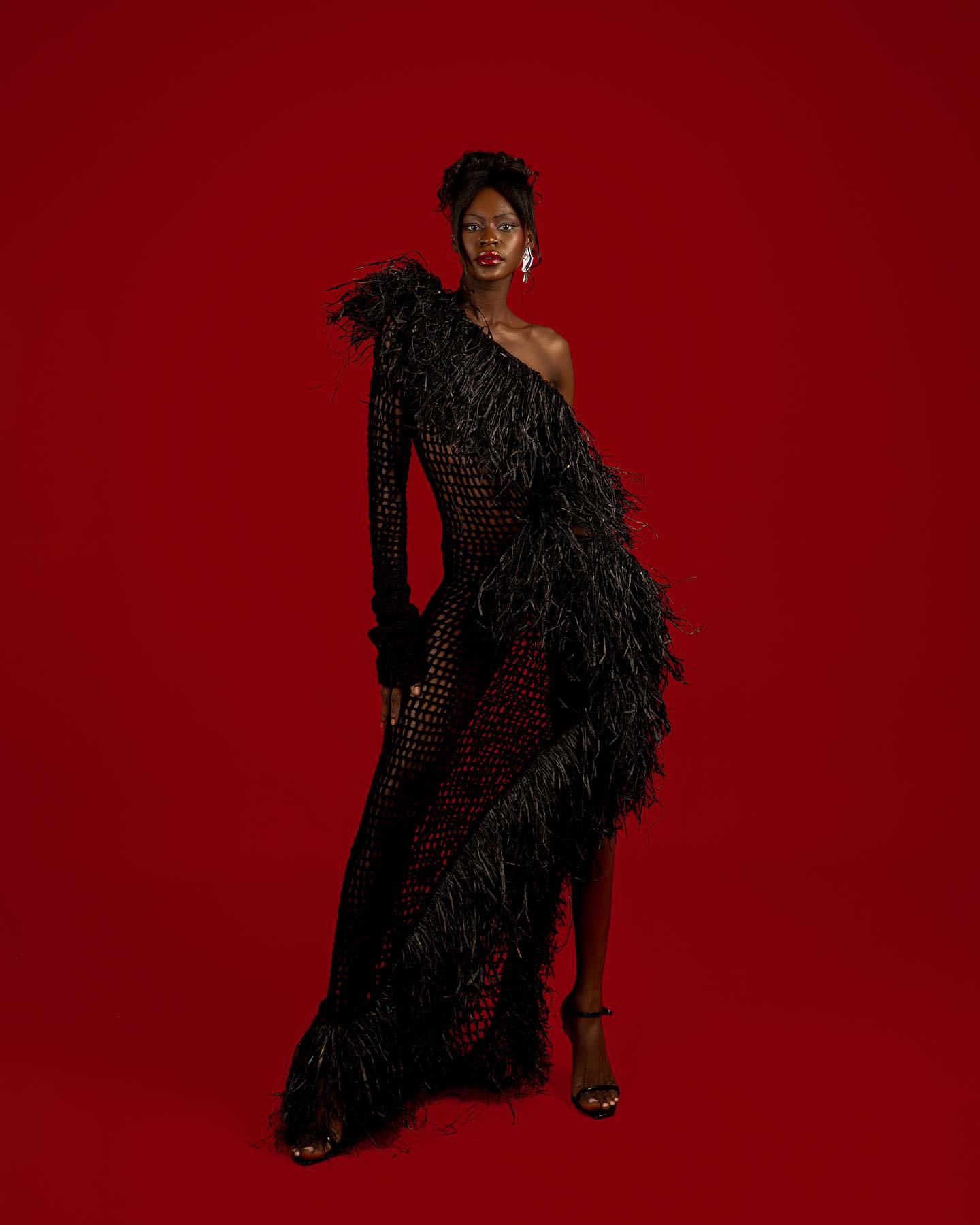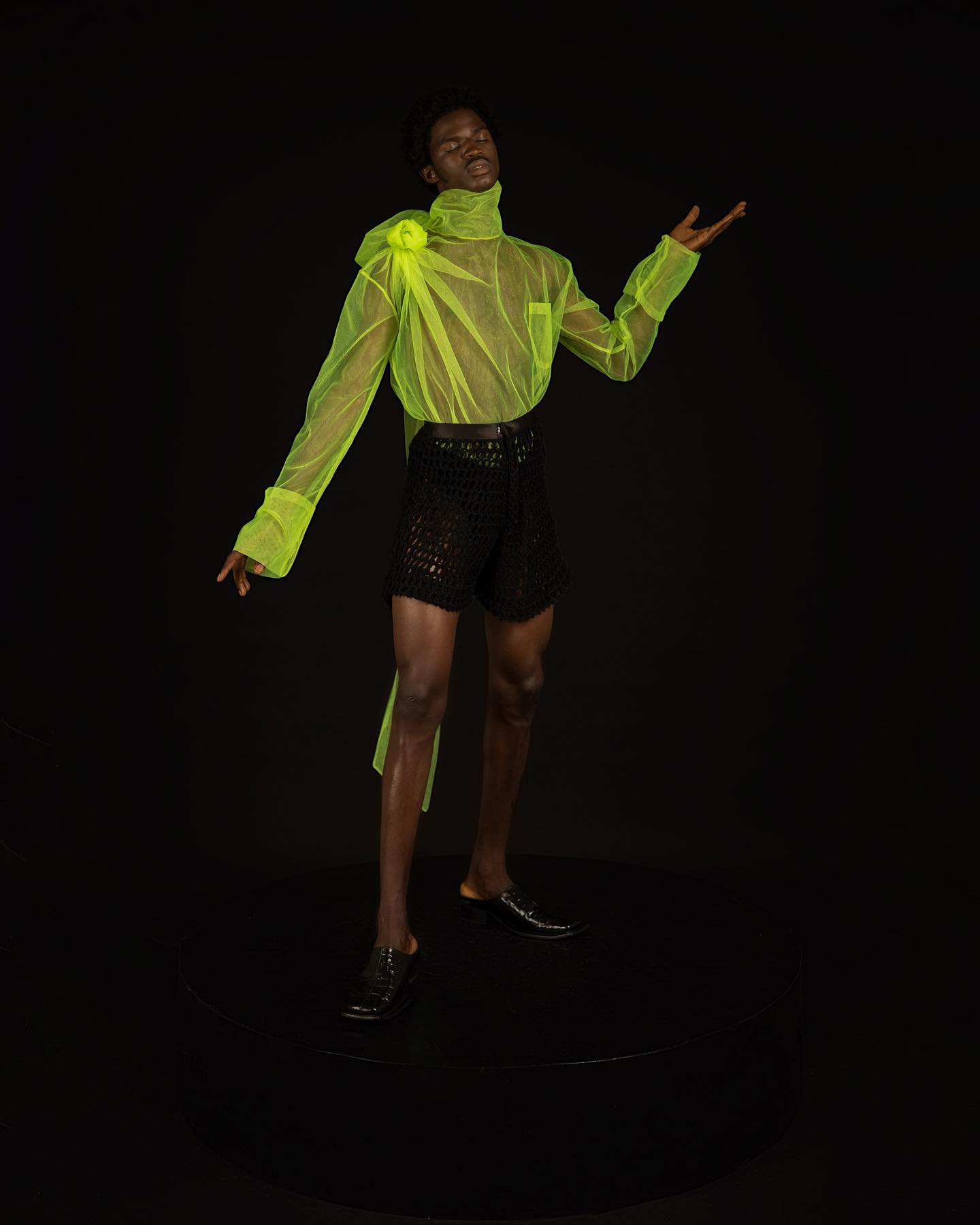
Frank Aghuno is a Nigerian designer who is heavily unfettered about societal expectations of fashion representation. Though he describes himself as shy, he is very much an advocate of wearing what your heart desires. In 2018, he founded his label Fruché, a contemporary brand offering awe-worthy silhouettes. His aim from the beginning has been to afford people the freedom to wear expressive designs that aptly work well no matter what climate they’re in.
Accolades the luxury designer has racked up over the course of his design career includes being stocked at The Folklore and Industrie Africa, two global fashion platforms dedicated to brands on the continent. Also, just last year a raffia dress by the brand was worn by Afrobeats superstar Ayra Starr on the cover of Teen Vogue.

Aghuno details his earliest fashion memory for me while we chat about his origins. He reminisces about sitting in his father’s living room as an 11-year-old and drawing sketches of the little things he could. He explains that he was inspired by his mother who had been a fashion designer in her youth, and his mother’s cousin who made hand-sewn Barbie doll dresses.
He goes on to express that he was intrigued by their repertoire and that guided him towards his path in design. His true journey kicked off in 2014 during his sophomore year in school where he studied finance at the University of Lagos. He had always wanted to pursue fashion and he recalls his family being supportive of his declaration that he’d be doing so. It was the best idea for a student held by Nigeria’s periodic university strike and they all contributed towards it. His mother had previously given him her old sewing machine and his cousin had taught him how to work his way with the machine and the financial investment in his brand fully sponsored by his late father.

Aghone spent weeks building his debut collection, hand-sewing each design one at a time. His twin brother painted a backdrop and then the lookbook that ensued made its way to online fashion blogs and also got him a spot at the Lagos Fashion Week young designers competition. This offered him the opportunity to make his runway debut there that same year: in 2014. However, his brand Fruché officially started in 2018.
The brand Fruché was created to appeal to a very modern taste, offering a fresh twist to cloth-making that includes fluid construction, and elaborate knot detailing while catering to both women and men. Those who are keen to express themselves in clothing that goes beyond societal norms are the target audience too. The designer’s approach to detailing is exquisite, especially the knotwork that graces some pieces. Each knot is made with a unique intricacy and sometimes comes with tulle renditions or drape patterns.
Aghuno says that the origin of his signature knot design comes from combining different styles of dresses into one dress. Initially, he felt this was an experimental design code–but he explains that he was determined to present something that was new in the Nigerian fashion market. In some way, he was inspired by rebelling against the status quo.

“I think [of] rebellion because people don’t see knots on clothes every day,” he said. “I just felt like this was the strongest, edgiest thing I could think of. It wasn’t so loud in the sense that it wasn’t studded, it wasn’t chained, but it was still rugged. It was still me manipulating fabric. And it would just accentuate a mood or a feeling,” he tells ESSENCE.
Aghuno is someone who associates every collection with a specific emotion. Most times it’s anger or happiness. And they are always associated with a very strong story that appeals personally to him. In total so far he has designed six collections. His first was “Free Spirits,” the 2018 collection inspired by his grandparents’ free-spirited lives in Benin City. The work of Solomon Osagie Alonge, Nigeria’s pioneering photographer who was also from Benin City was also a source of inspiration. Alonge captured the eccentricity of Nigeria’s earliest social and political class in the 1970s. The collection featured beaded skirts, folded tulle gowns, feathered dresses, and a shirt with axe-shaped detailing.
“Ibeji” was somewhat of his third collection and was released post-pandemic, enlightening the myth of the Yoruba Orisha who represents “twins” and partly telling his story of the designer being a twin. To fully express the story he creates a duality of each design–making a twist to each piece. Other collections include “See Finish” which features denim patchwork. “Ode to Gabo” was created with sustainable textiles. His most recent “Do You Know Who I Am” was an eclectic collection with several variants to the brand’s signature knot detail, and was created in vibrant colors.

The designer’s forthcoming collection is titled “Shameless” and for Aghuno, it’s a two-faced view–it encompasses the right and the wrong ideas associated with being shameless. “In my life, I’m very shy,” he says. Aghuno adds that he’s learned that to make it in life one has to be shameless. He goes on to explain that whether it’s by making a TikTok video or in the pursuit of happiness, fame, or elevating one’s business–being shameless can benefit you. “That’s my inspiration for this collection, shameless in my designs, and that has driven me through the years, in the process of sketching and just figuring out what I’m trying to say.”
The collection also critiques the shame enforced by African culture and how that breeds bigotry and lack of expressiveness, a major vice that the brand Fruché seeks to subvert. For this collection, Aghuno is keen on being more sustainable which is why he is opting for locally-made textiles. For instance, Aso Oke and Adire are hand woven, dyed, and then used by Aghuno.
Not everyone understands the message Aghuno is communicating with Fruché and at times that’s worrisome for the designer. In the past, he applied to showcase his collection internationally but he is constantly being declined with the feedback that his designs were too revealing or not polished enough. Rather than admitting defeat the designer continues to persist. Here he says he will never stop making revealing clothing–he feels that it’s a part of who he is as a creator.
“As Africans, we like to sexualize bodies, forgetting before the West invaded us, we were dressing however we wanted,” he said. “I recently just traveled to the UK and it was like a freezer. So I get why they wear so many layers. But it’s so hot on the continent and with my designs that’s the message I’m passing along–you can wear whatever you want and express yourself,” Aghuno adds.







